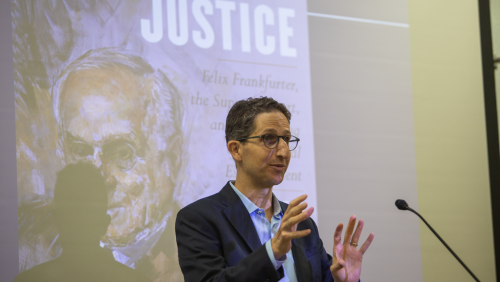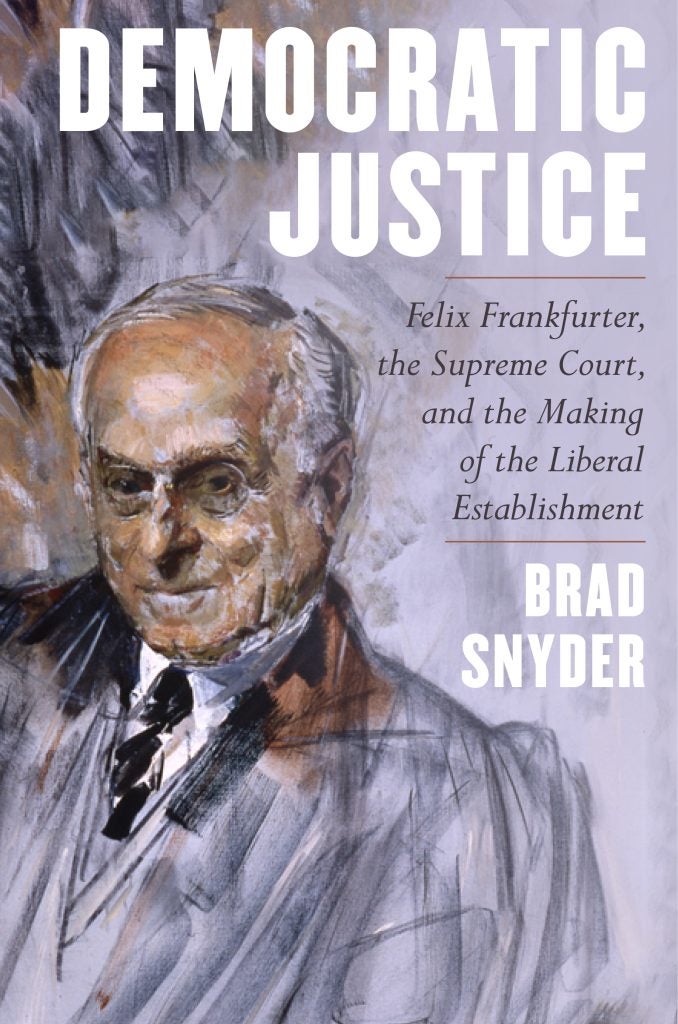Professor Brad Snyder: Casting New Light on Justice Frankfurter’s Legacy
December 14, 2022

The Georgetown Center for the Constitution hosted an event for Prof. Brad Snyder to talk about his new book, "Democratic Justice."
In his definitive new biography of Supreme Court Justice Felix Frankfurter, who served on the bench from 1939 to 1962, Georgetown Law professor Brad Snyder reevaluates the conventional story of Frankfurter’s progression from liberal advocate to conservative jurist.
“Democratic Justice: Felix Frankfurter, the Supreme Court, and the Making of the Liberal Establishment” shows Frankfurter, despite his flaws, to be a champion of democracy – and prophetic in his defense of judicial restraint.

Professor Brad Snyder, author of “Democratic Justice”
We recently spoke with Snyder about his book and Frankfurter’s continued relevance today.
For the laypeople out there, can you give a short introduction to Frankfurter’s judicial philosophy?
In his time and shortly after his death, he was portrayed by liberals as a conservative entity of the Warren Court. Joseph Lash, a historian I admire very much, wrote in the 1970s that Frankfurter was “uncoupled from the locomotive of history.” I think people were still holding on to some hope that we could rely on the courts to solve all of our most pressing political and social problems.
Frankfurter’s judicial philosophy was the opposite of that. He had a longer view of history, and realized that the Court was historically a reactionary institution, and that we should resolve our problems in the halls of Congress and at the state level. And I think he’s been vindicated.
How do you see the perspective on Frankfurter evolving?
Really smart people in the academy are starting to come around to the idea that we should adopt a kind of judicial restraint position. They’re re-reading people like 19th century Harvard Law professor James Bradley Thayer, who wrote an incredibly influential law review article in 1893 that was a guiding light for Frankfurter.
I can sum up the article in a sentence: “The Supreme Court should not overturn a law unless it’s unconstitutional beyond a reasonable doubt.” The current Court has moved very far away from that.
Frankfurter’s life story is really captivating.
It’s an incredible American story. He came to this country from Austria in 1894, not speaking a word of English. Within a few short years, he was giving an address at his elementary school graduation. The real transformation for him comes when he leaves synagogue during High Holy Day services and says, “I’m never coming back.” His religion becomes Americanism.
 Frankfurter served as an adviser to numerous presidents, most notably Franklin Roosevelt. Was there something in his personality they found especially compelling?
Frankfurter served as an adviser to numerous presidents, most notably Franklin Roosevelt. Was there something in his personality they found especially compelling?
He was a live wire and a complete extrovert – both Teddy Roosevelt and FDR saw him as a shot of adrenaline. If he were alive today, he’d be on three or four different social media platforms and have a zillion followers.
But they also came to him for ideas because he had a lot of expertise in labor law, criminal law, public utilities and railroad regulation, not to mention constitutional law. He was on the front edge of scholarship in administrative law.
But even a great thinker can have feet of clay. He was in the majority in the Japanese internment case. He probably shouldn’t have even heard that case because he was advising the Secretary of War on policy. Those kinds of ethical compromises and violations of separation of powers shouldn’t happen anymore, and with good reason.
In addition to your constitutional scholarship, you’ve written two books on baseball and teach a course in sports law. What sparked your interest?
After graduating from college, the thing I most wanted to do was cover the major league baseball team I’d grown up rooting for. I went to work for the Baltimore Sun, but realized I was much more interested in covering the Congressional baseball antitrust hearings during the 1994 strike.
Frankfurter and my baseball books are really connected. When I was writing about baseball star Curt Flood’s antitrust lawsuit that went all the way to the Supreme Court, fortuitously, Justice Harry Blackmun’s papers opened up at the Library of Congress. Blackmun wrote the majority opinion in Flood v. Kuhn. I got completely hooked. From there I knew I wanted to be a law professor and write about constitutional history using the justices’ papers.
Are you still an Orioles fan?
The short answer is yes – but it took a while for me to be a fan again. I can really appreciate this new generation of players and the team’s revival. I took my son for the first time last year, going through all the nooks and crannies of the ballpark. It was one of those great father/son moments.